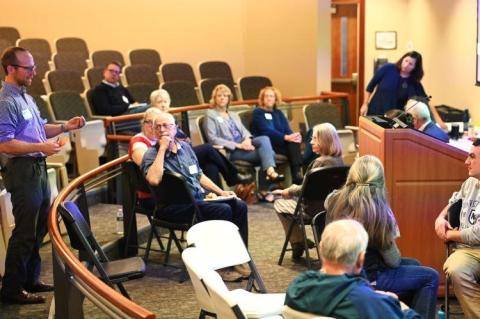
New Hampshire Together participants at the UNH Franklin Pierce School of Law.
The evening conversation started out with some constructive instructions: Listen with curiosity and empathy; connect with respect; speak from your own experience.
The goal, suggested New Hampshire Together moderator Martha Madsen, was to encourage candid exchanges, identify common areas of concern, and begin to seek solutions.
The New Hampshire Together project involves a statewide series of small-group discussions focusing on Granite State issues. On Oct. 25, the Warren B. Rudman Center for Justice, Leadership & Public Service hosted a discussion at the UNH Franklin Pierce School of Law.
"It has been a privilege to hear from everyday NH residents: what they appreciate about their communities and also what their common concerns are. It is inspiring to think we can find common ground and move forward on issues that have been neglected due to polarization." — Martha Madsen, NH Project Manager for The People
During the Rudman Center event, two groups of participants, which included community members and UNH Law students and staff, shared the following perspectives:
Granite State Strengths
- Town Hall meetings, strong connections between citizens and local government.
- The small size of the state enhances a sense of community.
- A growing sense of diversity, a welcoming spirit in Concord toward refugees.
- A widespread appreciation for outdoor activities and concern for the environment.
Granite State Problems
- Disparity in public education.
- Homelessness
- Cost of living
- Access to mental health and crisis counseling
- The large size of state government, particularly the NH House of Representatives, and over-reliance on volunteer legislators, which favors certain demographics and mindsets.
- Politicizing of the state Department of Education.
- Over-reliance on property taxes to fund public education.
- Underfunding of public education
- Drug use and overdose deaths.
- Lack of public transportation.
- The aging of the N.H. population, young people leaving the state.
General concerns
- School shootings and gun violence.
- Domestic terrorism
- A breakdown in in-person communications, with over-reliance on online communications.
- Inadequate attention to the problem of climate change.
- Decline of local journalism.
- A decline in empathy.
- Lack of trust across the political spectrum, inadequate communication among groups with differing views.
Upcoming New Hampshire Together conversations:
- November 2 in Newport at the Old Courthouse
- November 15 in Manchester at Airport Diner
- November 28 at Conway Public Library
- December 5 at Rochester Library
- To be scheduled: Littleton, Keene, Hanover/Lebanon, Nashua
To learn more about this initiative or join an event (online or in-person): https://www.thepeople.org/newhampshire. Please share with your neighbors and friends.
More information from N.H Together:
Participants will be invited to join a “Citizens Assembly” event in June 2024, where people with a wide range of perspectives will have the opportunity to seek agreement on steps that could produce better public policy results, in ways Granite Staters have said they want.
Who is behind this initiative? New Hampshire Together builds on the work of Katie Fahey, Executive Director of The People, who successfully led a group of citizens to end gerrymandering in her home state of Michigan. It further leverages expertise of politically and ideologically diverse organizations including the Listen First Coalition and local expertise from groups like New Hampshire Listens, the Sunshine Initiative, and Open Democracy. The initiative is funded by a national, bipartisan philanthropic collaborative called The New Pluralists, committed to reducing social and political polarization and amplifying the public’s voice in democratic decision making, and it has the potential to serve as a template for similar projects in other states. We are starting in New Hampshire both because the state is geographically small, and because it has a remarkably strong civic culture that offers a positive model for the nation. Why should I participate? How do you feel about the direction of the country, socially, politically, or economically?
Action on any “Citizen Assembly” recommendations will require super-majority support from participants representing the political and demographic diversity of the state. If final recommendations are approved, participants will be asked to select a subset of the group to then proceed to coordinate with a legislative working group to pursue legal changes needed to implement the desired recommendations. Interested legislators will have been approached and invited to participate in this effort from the outset, which should give organizers a sense of how most effectively to collaborate with legislative partners at this stage. The endeavor will be considered complete when new policy has been enacted and successfully implemented.
